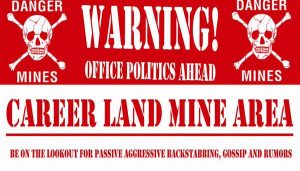I’ve recently had several conversations with people who have just recently entered the workforce. As they have shared stories about their early career experiences, it is clear that for many, this is not exactly what they expected. Here is a quick summary of the environment they describe to me:
- Job opportunities and starting salaries are more limited than they expected.
- The battle for the best assignments and promotion opportunities is more intense than they expected.
- Office politics and “unfair” practices sometimes mean that talent, ambition and hard work are not rewarded fairly.
- High income earners are older and seem distant/different, and HOW they attained their wealth isn’t obvious.
- The “system” seems rigged and the wage gap between the “haves” and “have nots” seems wider. (True or not, this is a common perception.)
The focus of my work for more than twenty years has been helping people develop the skills, habits and mindset necessary to drive high trajectory careers. When it comes to career advice I prefer to focus on practical, real world skills and strategies, dealing with the world as it is rather than debate about the way things “should” be.
Here is a summary of the advice I have shared with some of these younger workers. In the spirit of full disclosure I must admit that much of this advice was not especially well received. Nevertheless, if a young person is truly focused on driving a high trajectory career, I strongly recommend the following:
Become more discerning but less judgmental of the people you work with. Virtually everyone you work with wants to do a good job. Some of course are more effective than others, but before deciding that someone is a jerk, idiot or moron, try to more deeply discern the reasons for their offending behavior. Remember than anyone can work well with positive, talented and motivated people. But it takes a real pro to work well with flawed, less-than-talented under-achievers. Developing the ability to work productively with flawed people will be a huge career booster. Also, the more deeply you get to know most people, the more you understand the root causes of their “flaws,” the less annoying they become – most of the time.
Don’t expect career help from anyone in Washington D.C. Expecting Sanders or Trump or Clinton or whoever to do anything that will have a substantive impact on your career allows you to let yourself off the hook. Waiting for Bernie takes some of the pressure off of you to fully “own” your career progress (or lack thereof). I’m all for political activism, but be very thoughtful about your expectations and avoid the mindset of WAITING for political change to drive your career change. You can fight for social justice AND fight for your own career progress.
Let go of “fairness” and “should be.” Build your career on the way things are. This one is tough because I don’t want to discourage people from driving needed change in their businesses. But I meet so many people who use the need for change as an excuse for their career stagnation. Whatever the current circumstances in your business may be, some people figure out how to grow their careers. Some people “crack the code” and advance. Some people achieve and succeed and drive a higher/faster career trajectory, in spite of the difficult circumstances. Develop the mindset of driving your career forward and pushing through the challenge, rather than waiting for the challenge to go away.
Sometimes the worst people/situations provide the best career experience. And sometimes not. Because most people are flawed, most workplaces are flawed. If you are waiting for the perfectly fair and rational meritocracy where talent and hard work always leads to career progress, you are going to be waiting for a long time. Or you’ll be hopping from job to job, searching for the elusive perfect boss or perfect company. Of course you should quickly leave a bad situation if you are experiencing physical mistreatment or illegal/unethical activities – but in less extreme circumstances ask yourself if there is an opportunity to grow from overcoming the adversity.
When I have shared these thoughts with younger workers, most of them nod politely but give me that “he doesn’t get it” look. So I’ve been thinking about this a lot, wondering if I’m not communicating my thoughts effectively, or maybe I need to rethink my perspective. In that spirit, I would love to hear YOUR perspective in the comments section below.




 The key is to be discerning, because some cacti will only cause you pain and grief. And when they hurt, those needles can dig deep. So think carefully at least give your instinctive response a second thought.
The key is to be discerning, because some cacti will only cause you pain and grief. And when they hurt, those needles can dig deep. So think carefully at least give your instinctive response a second thought.
